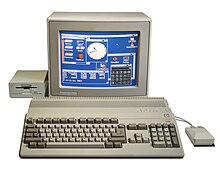Emulation/Amiga

About Amiga
[edit | edit source]Amiga was a series of high end multimedia computers which were popular from 1985 to the early 1990's, before the original line was discontinued in 1996. Due to their high end graphics capabilities, a number of games were developed for them. A few emulators were actually written to run on the Amiga itself. A number of programmers cut their teeth on the Amiga, which was perhaps a factor which lead to a number of high quality emulators and software support.
Amiga Emulators
[edit | edit source]UAE
[edit | edit source]UAE is a common emulator of Amiga software. UAE is free and open source software. It has almost any feature one would need when emulating Amiga hardware, and a number of versions of UAE exist for different platforms.
Other
[edit | edit source]Fellow is an older Amiga emulator, which was common on older hardware.
System Files
[edit | edit source]Most Amiga emulators require an Amiga operating system and a boot ROM to run original Amiga software.
Amiga Forever
[edit | edit source]A legal compilation of the Amiga operating system versions can be had by obtaining the proprietary Amiga Forever package. This is a commercial package from the rights holders which is available fairly cheaply digitally, or a bit more for a physical copy. It contains a number of operating system and boot ROM versions, as well as a number of games and demos.
Alternative Operating Systems
[edit | edit source]A number of alternative operating systems have been developed to run on Amiga hardware, some of which may also run on Amiga emulators.
Alternatives to Amiga Emulation
[edit | edit source]
Contemporary hardware reimplementations of the Amiga exist, such as the Minimig.